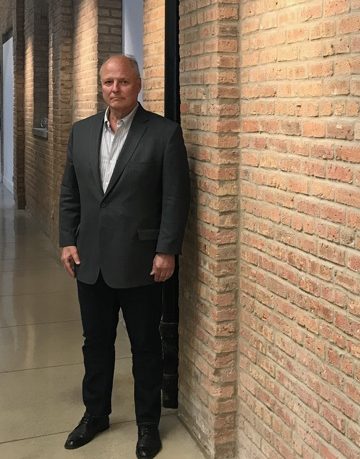
BY JUDY CARMACK BROSS
From antitrust lawyer to distributor of award-winning indie movies to a vintner of fine wines—the plot twists of Bill Schopf’s own life mirror those he develops each day from the West Loop office of his Music Box Films.

Photo by Robin McCown Mumford.
Canny in real estate, creative as a gallery owner now grape grower at Dablon, his Harbor Country vineyard just named Michigan’s best by Wine Enthusiast Magazine, and celebrated as owner of the Music Box Theatre, Bill sees life this way:
“I live life by walking through doors. Recall that image of a person on a stage seeing six doors and having to choose. I see it as choosing one and then when you walk through that, there are another six doors. I certainly didn’t think when I had my law firm that I would be making alcohol and distributing movies.”
Bill turned to Chicago architect Don Shapiro to design his Music Box Films headquarters in a 1923 lumber factory next to a Do-Rite Donuts just off Randolph in what is now one of Chicago’s most vibrant neighborhoods. The soaring rafters are of wood sold at the original factory. Shapiro also designed the winery with its vaulted ceiling tasting room and the inviting lounge at the Music Box Theater.
Bill has long had a canny eye for great real estate, making his first purchase in the 1970s when he was a law student: “I was very grateful to the legendary Sam Lizzo at the Northern Trust for making the loan to make it possible.”
Music Box Films boasts A Man Called Ove, nominated for the Academy Award for Best Foreign Language Film, and Steig Larsson’s trilogy, including The Girl with the Dragon Tattoo. Current movies like The Guardians, set in France in 1915, and Back to Burgundy, a coming of age story set in a vineyard, are now in theaters across the country. Manolo: The Boy Who Made Shoes for Lizards about Manolo Blahnik, the high-end Spanish designer, and other recent purchases are available on DVD and video-on-demand.
“We buy films from around the world that then appear in theaters, on DVDs, Amazon, Blu-ray, and via video-on-demand. We are looking for well-made, well-shot international films. Most are dramas and documentaries. Comedies have a hard time crossing borders.
“I spend time at various film festivals. At Cannes there’s no red carpet time—there are screenings every 30 minutes, and often it’s not possible to stay through the entire film. You have to get to know all the sales agents.”

Our Blood is Wine.
Bill has produced the documentary Our Blood is Wine, now available on DVD, marrying his mutual interests.
“The director Emily Railsbeck, who was once an intern in our office, decided to make a movie about the birthplace of wine. She follows the American sommelier Jeremy Quinn, one of Food & Wine’s Sommelier’s of the Year, to the country of Georgia, where they were making wine long before the alphabet was invented.”

Filming Our Blood is Wine.
Bill is at his Chicago office Monday noon until Thursday noon, when he heads for Baroda, Michigan, and Dablon, just an hour and a half away. He purchased 44 acres in 2008 and now produces chardonnay and pinot noir. Dablon is the only Michigan winery Wine Enthusiast mentioned in a state-by-state selection of favorite bottles.
Here’s how they praised his 2015 Cabernet Sauvignon, Lake Michigan Shore:
“Delightful aromas of red plum and cherry tomato float above bread dough and basil on the nose. The juicy palate brings tart cherry and more plum into the mix, with white pepper and green herb accents. This offers a light and easy mouthful of vibrant acidity and is structured by velvety tannins. The juicy cherry finish is utterly charming.”
Bill describes the Baroda countryside:
“The climate and elevation are quite similar to Burgundy. I am very hands-on in growing the vines and exceptional grapes. When we got started, I worked closely with chemists and biologists. We have a tasting room and wine club, and distribute to Illinois, Indiana, and Michigan.”
Born in Muskegon, Michigan, Bill moved to Chicago as a child. His interest in films began as a young teenager in the 1960s, watching the foreign language films on WGN at 10:30 pm:
“It was always a fight with my mother to get me to go to bed so that I would get up for school in the morning. When I was a law student, I would go occasionally to the theater on South Michigan, where they showed art films.
“Ultimately, I bought my own theater, the Music Box, in 1986. At the time it was a retail mall with 8 stores and just happened to have a 750-seat theater inside. By 1989 Sex, Lives and Videotapes had come out and independent films became a good business. We added a second theater.”

Photo by Robin McCown Mumford.
A favorite hangout lounge at the Music Box described by Bill as purposefully “shabby chic” is often full of moviegoers engaged in spirited dialogue:
“We have very loyal customers who appreciate the balance of programming from first run to independent films. We now offer special events, maybe three a week, such as fashion shows or other reasons for people to leave their dens and come out to the movies. The theater is doing quite well.
“The Music Box has a close relationship with Warner Brothers. We are able to show 70 mm films, where most multiplexes these days no longer have projectionists, who are necessary to show these films. We also show 35 mm, but 70 mm has a great advantage because it offers higher resolution. For the fiftieth anniversary of 2001: A Space Odyssey, we bought a 70 mm copy, and the new print looks as groundbreaking as it looked in 1968.”
With the success of the doors Bill has opened so far, we can’t wait to see what the next set will bring.







